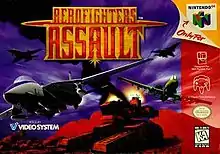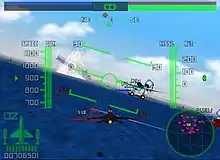Aero Fighters Assault
Aero Fighters Assault[lower-alpha 1] is an arcade-style combat flight simulator developed by Paradigm Entertainment and published by Vic Tokai and Video System for the Nintendo 64 in 1997.
| Aero Fighters Assault | |
|---|---|
 North American Nintendo 64 cover art | |
| Developer(s) | Paradigm Entertainment |
| Publisher(s) | |
| Platform(s) | Nintendo 64 |
| Release | |
| Genre(s) | Air combat simulation |
| Mode(s) | Single-player, multiplayer |
It is the first and only game in the Aero Fighters series with 3D computer graphics, as well as the sixth and final title of the series before Video System filed for bankruptcy during 2001. The game pits a group of four pilots against a fictional world-dominating organization Phutta Morgana.
Gameplay

Mission objectives must be completed within a time limit.[2] Points are awarded for having all wingmen survive, how many defensive countermeasures and special weapons the player has remaining, and how many hits the plane has remaining when the stage ends. In many cases, earning high point values unlocks a bonus mission during gameplay, with a total of four bonus missions in all.
There are four aircraft to choose from at the beginning, each with a different special weapon and missile type. Two more aircraft can be unlocked; one via push-button code, and the other by successfully completing all of the missions in the game including the bonus missions. The aircraft paint scheme for the four main characters is changeable by pushing the R-button in the selection screen. Additional planes can also be unlocked for the multiplayer mode based on progress in the single-player campaign.
The game also features a two-player deathmatch option in which two players face off against each other.[3]
Reception
| Aggregator | Score |
|---|---|
| GameRankings | 59%[4] |
| Publication | Score |
|---|---|
| Electronic Gaming Monthly | 28/40[5] |
| Famitsu | 27/40[6] |
| Game Informer | 6/10[7] |
| GamePro | 14.5/20[8] |
| GameSpot | 5.4/10[9] |
| Hyper | 70%[10] |
| IGN | 5/10[11] |
| N64 Magazine | (US) 60%[12] (EU) 58%[13] |
| Next Generation | |
| Nintendo Power | 6.9/10[15] |
Aero Fighters Assault received mostly mediocre reviews. Commentary varied considerably from critic to critic, though the more common criticisms included the music[9][11][14][15] and the inane dialogue of the voice clips.[9][11] A number of reviews praised the diversity of the missions,[5][9][11] but some found that the overall formula of enemy jets, boss, enemy jets, boss to be repetitive and unengaging.[5][14] Most also remarked that while the graphics are appealing in still shots, with impressive effects, the frame rate is choppy enough to hurt both the visual appeal and gameplay.[5][8][9][11]
The game's flight models,[5][9][14] controls,[5][9][11][14][15] and third person perspective during dogfights[5][9] were all widely praised. Nonetheless, overall assessments were dismal, with most comparing it unfavorably to its PlayStation competitor Ace Combat 2[5][9][11] and/or to Paradigm's previous Nintendo 64 offering, Pilotwings 64.[8][11] GamePro found the controls difficult and the overall slowness of the game frustrating.[8] Next Generation said: "All in all, the game needs more high-intensity dogfight levels, realism instead of science fiction trappings, and less linearity. Had the gameplay matched its flight model, Aero Fighters Assault would have been a real gem. But as it is, the game's not quite a diamond in the rough".[14]
Nintendo Power found the game often interesting and impressive in single-player mode but tedious in multiplayer mode, and concluded it is overall respectable but doesn't outdo the flight sims available on PC as completely as might have been hoped.[15] GameSpot and IGN both concluded that the game has some solid features but simply lacks fun, with IGN describing it as "dreadfully average and [lacking] the balance of many N64 games".[9][11] Contrarily, three of Electronic Gaming Monthly's four reviewers found the game to be fun once one gets past its flaws, though they allowed that it was not as polished as other titles, and the remaining reviewer, Shawn Smith, said the fun it offers is fleeting.[5]
Notes
- known in Japan as Sonic Wings Assault (ソニックウィングス アサルト, Sonikku Wingusu Asaruto)
References
- IGN staff (November 20, 1997). "Air Simulation Soars to Nintendo 64 [release date mislabeled as "November 20"]". IGN. Ziff Davis. Retrieved December 26, 2020.
- Shadow Dragon (November 1997). "AeroFighters Assault (Preview)". GamePro. No. 110. IDG. p. 101. Retrieved December 26, 2020.
- "Aerofighters Assault [sic]: Look Out! Bogey on my 64!". Electronic Gaming Monthly. No. 98. Ziff Davis. September 1997. p. 104. Retrieved December 26, 2020.
- "Aero Fighters Assault for Nintendo 64". GameRankings. CBS Interactive. Archived from the original on December 9, 2019. Retrieved August 21, 2016.
- Boyer, Crispin; Ricciardi, John; Kujawa, Kraig; Smith, Shawn (January 1998). "Review Crew: Aerofighters Assault [sic]". Electronic Gaming Monthly. No. 102. p. 153.
- "ソニックウイングス アサルト [NINTENDO64]". Famitsu (in Japanese). Enterbrain. Retrieved December 26, 2020.
- "AeroFighter's Assault [sic]". Game Informer. No. 59. FuncoLand. March 1998. Archived from the original on September 9, 1999. Retrieved December 26, 2020.
- Scary Larry (January 1998). "Aerofighters Assault [sic]". GamePro. No. 112. IDG. p. 78. Retrieved December 26, 2020.
- Fielder, Lauren (November 18, 1997). "Aero Fighters Assault Review". GameSpot. CBS Interactive. Retrieved August 21, 2016.
- Wildgoose, David (October 1998). "Aerofighters Assault [sic]". Hyper. No. 60. Next Media Pty Ltd. p. 74. Retrieved December 26, 2020.
- Schneider, Peer (December 1, 1997). "Aerofighters Assault". IGN. Ziff Davis. Retrieved August 21, 2016.
- Davies, Jonathan (January 1998). "AeroFighters Assault vs Wild Choppers (Import)". N64 Magazine. No. 11. Future Publishing. pp. 40–45.
- Kitts, Martin (June 1998). "Aero Fighters Assault". N64 Magazine. No. 16. Future Publishing. p. 48. Retrieved December 26, 2020.
- "Aero Fighters Assault". Next Generation. No. 36. Imagine Media. December 1997. p. 160. Retrieved December 26, 2020.
- "Aerofighters Assault [sic]". Nintendo Power. Vol. 101. Nintendo of America. October 1997. p. 95. Retrieved December 26, 2020.